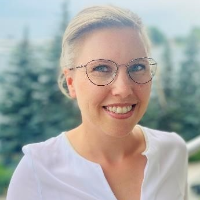5th International Conference on
Gynecology and Obstetrics
August 13-14, 2026 | Barcelona, Spain

Address: Avinguda Del Maresme 78 Ronda De Dalt Exit 15, 08940 Comella de Llobregat, Barcelona, Spain
Gynecology 2026

Institute of Human Genetics, Polish Academy of Sciences, Poland
Abstract:
In recent years, several papers have been published regarding identified genetic variants in men with nonobstructive azoospermia using the whole exome sequencing (WES). However, the whole exome sequencing (WES) provides a genetic diagnosis in only 25-50% of individuals On the other hand, literature shows that application of whole genome sequencing (WGS) to samples previously screened with WES may provide a conclusive cause in 42%. Although WES improved significantly in the last years, it is outperformed by WGS in terms of genomic coverage. Here, we used the whole genome sequencing to detect potential causative variants in patients with nonobstructive azoospermia (n=39) including also samples of which mutations in WES were not found (n=6). WGS using Illumina HiSeq X was performed to detect NOA-associated gene candidates. Variants were annotated using the Ensembl Variant Effect Predictor, utilizing frequencies from gnomAD and other databases to provide clinically relevant information (ClinVar), conservation scores (phyloP), and effect predictions (i.e., MutationTaster). Structural protein modeling was also performed. Using WGS, we revealed potential NOA-associated SNVs, such as: TKTL1, IGSF1, ZFPM2, VCX3A (novel disease causing variants), ESX1, TEX13A, FAM47C (previously known genes associated with infertility) and BEND2, BRWD3, MAGEB6, MAP3K15, RBMXL3, and SSX3 genes, which may be involved in spermatogenesis
Biography:
Agnieszka Malcher has 15 years of experience in research of male infertility at the Institute of Human
Genetics PAS in Poznan/Poland. Her interests from the beginning was focused on the search for biomarkers
of male infertility, most of all, based on the highthroughput technologies, like WGS, RNA-seq and
microarray technique. The wide profile of projects carried out in the Department of Reproductive Biology
and Stem Cells also allowed her to be involved in several research projects in the Department includingstem cells in vitro culture, using transfection methodology, genome editing such as CRISPR technology, as
well as molecular analysis of the androgen receptor. She is the author/co-author of >35 scientific
publications (PubMed), manager of grant projects (Preludium, Sonata NCN), contractor of over 10 grant
projects (NCN, NCBR), EMBO and Erasmus+ scholarship holder.
